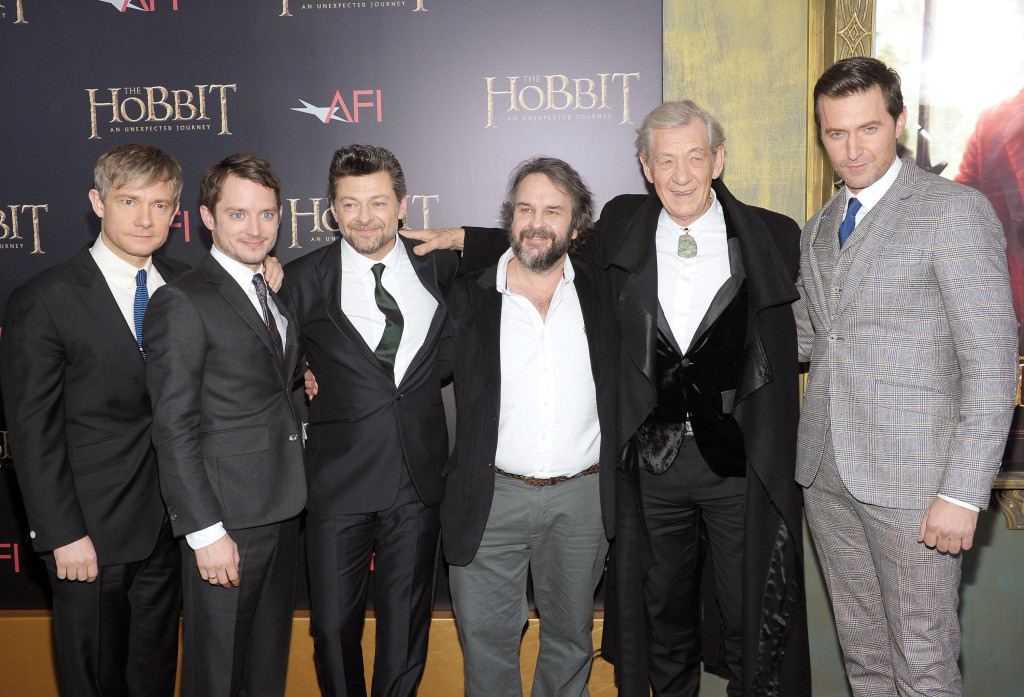Elsewhere in this week’s show, celebrated actor Sir Ian McKellen told us about his latest role as Sherlock Holmes, and dished about playing theater games with Dame Judi Dench. Then we asked him to stick around to take on our listeners’ etiquette questions. Read on for sage advice about how to address a knight’s husband.

Rico Gagliano: Each week you send us your questions about how to behave, and for answers, we turn, once again, to Sir Ian McKellan. One of the great thespians of our time and star of the “Lord of the Rings” and “X-Men” films. He’s also an activist and standard-bearer for gay rights. And he stars as Sherlock Holmes in the new movie “Mr. Holmes.” Sir Ian, we told folks you’d be here, you ready for their questions?
Sir Ian McKellen: I am.
Seat shuffling: the proper protocol
Rico Gagliano: All right, here’s something from Joe in Dublin, Ireland. Joe writes: “In a theater, when shuffling sideways down a tight row of seats…”
Sir Ian McKellen: Oh, yes.
Rico Gagliano: “…Should we face away from those who are seated, or face towards them?”
Sir Ian McKellen: Yes, well, you have two problems. You have to attend to the person sitting down — or maybe standing up, to let you go by — and the person in the row in front, whose coiffure you don’t want to upset.
So my suggestion is: Go sideways, present your, uh, rear view to the person sitting in the second row so that you can attend to the person sitting in front of you. Because if you were the other way ’round — which might seem polite to the people sitting down — you might be banging the row in front.
Rico Gagliano: With your butt.
Sir Ian McKellen: So the golden rule is: face the stage.
Do not correct Her Majesty
Brendan Francis Newnam: Now there’s an official answer to that. So, this next question comes from Daniell in Boston, and Daniell writes, “As the most perfect speaker of the most perfect English on the planet…” I believe that’s you…
Sir Ian McKellen: Steady on.
Brendan Francis Newnam: “…What’s the politest way to correct others’ pronunciation?”
Sir Ian McKellen: Oh, never, never correct anyone’s pronunciation.
Rico Gagliano: Really?
Sir Ian McKellen: Well, no. I mean, you can do it if a name comes up in a script and all the actors have to agree on how it’s pronounced. But no, in real life, no, no, no.
So, if someone calls me “Yan McKellen” or even “Yawn McKellen” — which is an unfortunate name for an actor — I would accept it.
Rico Gagliano: Does that happen? People mispronounce your name?
Sir Ian McKellen: Well, particularly at Buckingham Palace when they’re giving you a knighthood, yes, I’ve discovered. I was announced as “Mr. Yawn McKlelland.”
Brendan Francis Newnam: Oh, my goodness. “Sir Yawn.”
Sir Ian McKellen: And I didn’t correct Her Majesty.
Brendan Francis Newnam: There you go, two pieces of advice, Daniel: Do not correct someone’s pronunciation, and do not correct Her Majesty.
You shall not… ask him to say that line out of context
Rico Gagliano:Here’s something from J.R. in Virginia. J.R. writes, “Under any circumstances, is it OK to ask a performer to say one of his or her most noteworthy lines? ‘You shall not pass!’ comes to mind.”
Sir Ian McKellen: Well, I’d rather you didn’t ask me. I’ll decide if I’m going to speak that line out of context.
You know, I’m not a stand-up comic who has a funny catchphrase.
Although I’ve always thought it would be nice to have your own music, so that when you walked out onto a stage, your theme tune was played. You know [sings], “Thanks for the memory…”
Rico Gagliano: Not so easy if you’re playing Macbeth, though.
Sir Ian McKellen: No, quite. Well, I don’t know what the song would be.
What was the question?
Brendan Francis Newnam: “Is it OK to ask a performer to say one of their noteworthy lines?”
Sir Ian McKellen: No, it isn’t OK. No, it isn’t. Nor is it OK to take his photograph without asking first. Which, on the whole, people do.
Rico Gagliano: All right, there you go, J.R.
A Knight’s husband’s tale
Brendan Francis Newnam: This next question comes from Alf in Los Angeles, and Alf writes: “If you, Sir Ian, were to marry another fellow, how would you address your significant other? The wife of a knight is referred to as ‘Lady’… but what is the gay-married version of that?”
Sir Ian McKellen: Well that’s a very, very good question, and it’ll have to be answered. I mean, men refer to their “husbands.” And lesbians refer to their “wives.” That’s OK.
I think if you’re a “Sir”… “Sir Ian”… the other chap could be a Consort.
Brendan Francis Newnam: Oh! [Laughs.]
Rico Gagliano: Doesn’t that result in a power imbalance? It feels like, if you’re calling your significant other a “Consort”…
Sir Ian McKellen: Well, with regard to your title, yes, because the title is yours. But, I mean, I don’t use my title if I can avoid it. So I think if I had a husband, I’d call him “sweetheart” or “love,” or “the love of my life,” and…
Brendan Francis Newnam: “Darling.”
Sir Ian McKellen: “Darling,” yes, exactly. Those are all appropriate names.
Rico Gagliano: All right. Unless you’re angry, in which case he becomes “Consort.”
Sir Ian McKellen: “Consort,” OK.
How to deal with a pushy paper pusher
Rico Gagliano: And here’s something from Meg in El Paso, Texas: “What do you do when you have to work with someone,” she asks, “Who is pushy and who voices their opinion and comments on every topic?”
Sir Ian McKellen: Well, you’ve got to be very careful, when you’re working with someone, not to tell them what you think about them. Of course, you’re observing them. But as my favorite director says to me, “Ian, will you stop bothering about other people’s performances and get your own right, first?” And I think that’s what we should all really do.
Brendan Francis Newnam: You know, you bring up an interesting question. You’re talking about how a director will give you that note. Is it difficult, having been in so many movies, working with, like, a young director?
Sir Ian McKellen: Well, you can learn an awful lot from people who are younger than you and less experienced. Sometimes by their mistakes. But, you know, when I was watching Martin Freeman up close playing the Hobbit, I just marveled at his facility.

Rico Gagliano: What did you learn from Martin, do you think?
Sir Ian McKellen: Well, I learned from Martin never to do it quite the same each time, on each different take. And to genuinely believe you were saying the thing for the first time. I mean, it sounds obvious, but he does that to such perfection.
Rico Gagliano: I see. By the way, the thing I would learn from Martin Freeman, is how to dress. That guy is a natty dresser.
Sir Ian McKellen: He is a natty dresser, isn’t he? Yes, he tries to get me to go to his tailor. Not a chance, Martin!
Brendan Francis Newnam: Too natty for you?
Sir Ian McKellen: Yes, I don’t want to look natty! I want to look glamorous! I want my clothes to flow, not constrict me.
Brendan Francis Newnam: But you know what? I’m thinking of you — do you remember when you did the thing with Ricky Gervais in “Extras”? You’re wearing kind of a Hawaiian…
Sir Ian McKellen: Ricky Gervais? I’ve never heard of him!
Rico Gagliano: Distancing yourself from him, are you? [Sir Ian McKellen grunts.]
Brendan Francis Newnam: But you were kind of wearing a Hawaiian shirt in that, and you got like, a kind of a coral necklace. You seem very casual, very L.A.
Rico Gagliano: Is that you?
Sir Ian McKellen: Well, it could be. I’m wearing a necklace as we speak. Can you hear it? [He starts shaking his necklace into the microphone.]
Rico Gagliano: Describe it for the folks.
Sir Ian McKellen: I don’t know what it’s made of. It could be papier-mâché painted and varnished, or it could be little shells.
Rico Gagliano: All right, there you go, Meg. I think we answered your question somewhere in there.
Brendan Francis Newnam: Yeah, we have one last question. We ask this of each of our guests. The question is: what’s the most memorable get-together you’ve been to?
Sir Ian McKellen: Well, when I was living in the Hollywood Hills, in the early ’90s, making “Gods and Monsters” and “Apt Pupil” for Bryan Singer, I invited to supper Susan Sarandon, David Hockney — the painter — Gore Vidal and his partner.
And I cooked for them the two things that I cook best, and they didn’t particularly go well together. One was a curry, and then an English trifle, which is a confection of Jello, and custard, and cream, and fruit.
Well, Gore ate an awful lot of this food. Very gratifying for the cook and host…
Brendan Francis Newnam: Yes.
Sir Ian McKellen: …And the conversation was free-ranging and spirited. I mean, there were four gay men in the room and one straight woman. That’s quite a good combination for a happy party.
But the next day, on my answering machine, there was a message which said: “Ian. This is Gore. Yesterday, you supplied me with the most wonderful meal I have ever eaten in Hollywood. In Hollywood.”
Brendan Francis Newnam: Wow!
Sir Ian McKellen: “…Followed, may I say, by the most satisfactory bowel movement of my entire life. GORE.” [Everyone laughs.]
Rico Gagliano: Tell me you saved that!!!
Sir Ian McKellen: I wish I’d kept it… no, I didn’t save it. But that’s what he said, word for word.
Brendan Francis Newnam: To have been a fly on that wall would have been genius. Thank you for sharing that memory with us.
Rico Gagliano: And thank you for telling our audience how to behave, Sir Ian.
Sir Ian McKellen: OK, bye-bye!


